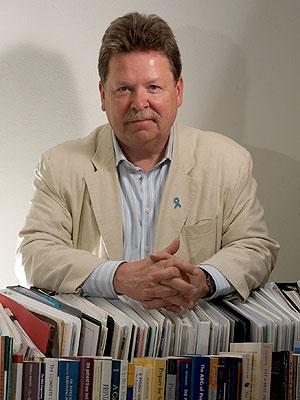Michael Todd has begun practicing Buddhism. From the teachings of scholar Thich Nhat Hanh, Todd takes that everything, from driving a car to writing a note to having prostate cancer, should be done mindfully. BREATHE, reads Todd’s license plate. That, he said, you can do mindfully as well.

Eight years after his diagnosis with prostate cancer and six after founding the Bath/Brunswick Prostate Cancer Support Group based at Mid Coast Hospital, mindfulness is Todd’s rallying call, working against what he has seen as a prevailing culture of silence in men’s health. That reluctance to speak openly, to be aggressive in seeking information about personal health concerns and to get educated about topics like prostate cancer yields pain — or worse — for men with cancer and their loved ones.
In the three months from his diagnosis to treatment, Todd became a diligent student of the complex reality of his cancer. He is now a leading advocate in Maine for men to demand early screening tests and to be informed about the decisions they face related to testing and treatment.
Todd’s view of prostate cancer is holistic, and much of his energy is focused on addressing the personal “journey” a man with prostate cancer undergoes, his acknowledgment that even for men like him, who have cancer years behind them and encouraging signs ahead, the experience is transformational.
“Certainly, my cancer experience has informed my practice of Buddhism,” Todd said. “I think a lot of people look at their lives differently.”
Before his own diagnosis, Todd knew “very little” about the cancer that radically changed his life.
“I just wasn’t aware that if my dad or brother had it, I would be more likely to have it,” Todd said. “I was just uneducated.”
Of the 1,100 men diagnosed annually with prostate cancer in Maine, nearly 160 will die of the disease. Men receiving treatment face side effects of erectile dysfunction and incontinence.
With his life at stake, Todd said the side effects became secondary issues. Todd’s fight is for the best information possible for men facing treatment and a method of early screening that he said is “not perfect,” but started the process that saved his life. (…)
When he receives a call of interest or a referral for the Bath/Brunswick support group, Todd returns an invitation to the man and his partner to chat with him in his office, where he is the director of development for Mid Coast Hospital. In the corner, a small cart holds a portable reference library on prostate cancer. He offers resources and extends an invitation to the group’s monthly meetings.
“We don’t give medical advice,” Todd said. “That’s not our job, but we let people know that they’re not alone, that there are options, that they need to educate themselves.”
Todd’s goal for the group has been to calm anxieties about prostate cancer and take a clear-headed approach, evaluating all options, helping to make good treatment decisions, supporting men with survivorship issues, and guiding men to necessary resources.
“Your friends are not going to be comfortable asking you constantly about your cancer,” Todd said.“That’s where the support community can really fill that gap for understanding and support.”
Todd measures the success of the group “by the impact we’re having on people’s lives, not on the number of people attending the monthly meetings.” Part of this impact, he hopes, is breaking down stereotypes about prostate cancer and changing men’s attitudes toward their health.
“Men are shaped, in a way, not to be proactive about their health, not to admit that they’re having problems, not to admit concern,” Todd said.
Looking back, his brother’s prostate cancer and his father’s rectal cancer are largely mysteries.
“We didn’t really talk about it,” Todd said. “Men don’t usually like to communicate about these things.”
After Todd’s treatment, talking was the first step. During the initial monthly meetings of the Bath/Brunswick group, attendees were engaged but reluctant to share their own stories.
“I had to model behavior for (the group) by sharing my own story and talking about some of my own personal issues,” Todd said. (…)
After six years leading the group, Todd is preparing to step down from his role as facilitator this August. The group is evolving and so is Todd’s survivorship, a process that truly began a full six months after his surgery. (…)
Todd has been honored for the quality of his leadership, serving as honorary chairman of the relay two years ago and receiving the American Cancer Society’s Quality of Life award.
In recent years, at the Relay for Life, members of the Bath/Brunswick group marched in Viking helmets as the Prostate Cancer Conquerors, raising a total of more than $25,000 for cancer treatment, outreach and support. This year, two men new to the group were in attendance, but overall support dwindled with some incensed about the ACS’s stance on PSA testing. (…)
Author: Darren Fishell
Source: www.timesrecord.com




